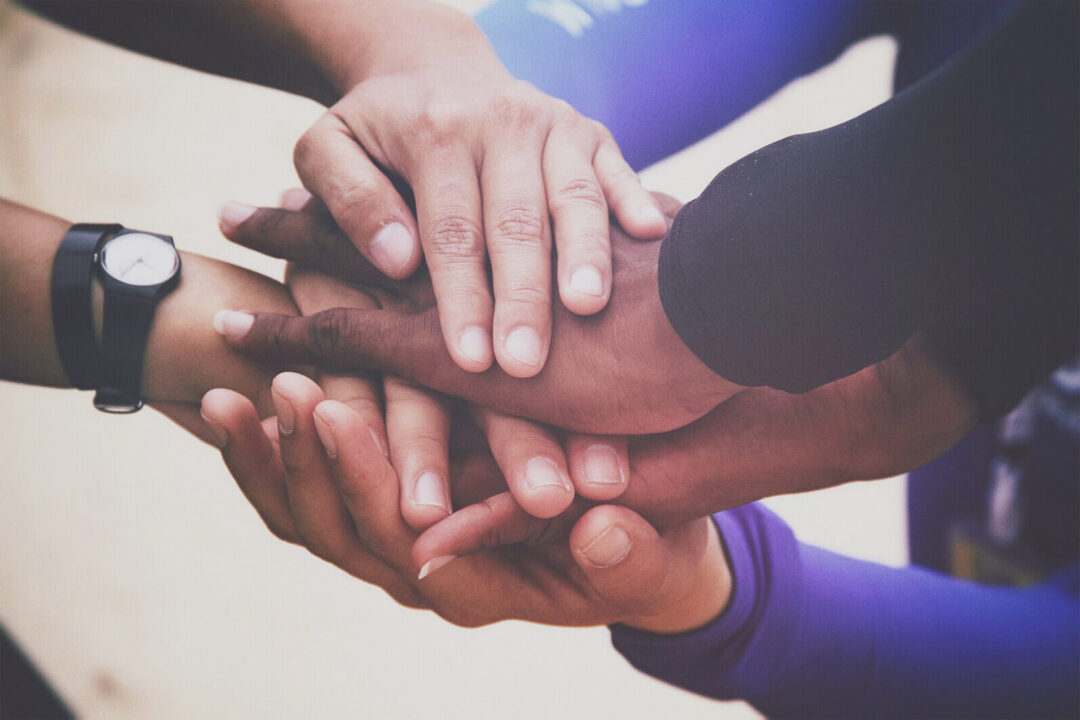Women: Agents at Change to regenerate society
We live in a disconnected society where every day the importance as well as the economic and social urgency are emphasized to care for human ecology, as a sine qua non condition qua non to “safeguard our common home and its inhabitants.
Today, society is sensitized by the pollution of rivers, seas and air, by the holes in the ozone layer; by abuses in fishing or logging of forests, or by the destruction of forests. The costs caused by excesses in the construction of housing. There is awareness of the excess waste, a product of exaggerated consumption that causes effects that end up being impact negatively on human beings, on their relationships and, therefore, on their quality of life. However, it finds it difficult to admit that the human ecosystem in which it lives is also contaminated.
The negative cycle flows from that polluting culture, where contents and ideas prevail to a detached, individualistic and relativistic society, which produces companies that are short term, weak families and lonely, dehumanized and off-centered people.
We can understand reality and the world in which we live in two antagonistic ways: one is in the face of disasters and the difficulties they present, with emphasis on the following and blaming the environment for the destruction of the human ecosystem. The other is proactive, positive and hopeful, with the intention of improving that reality in which we are immersed. It is evident that there is an urgent need to preserve the social health of the people, of the families and the human communities in which we work and with which we relate; the current social environment is unsustainable and we need to act now in order to avoid a decline irreversible. But how?
Who can regenerate this society? Systems? Structures? The answer It is evident that it is the people who design and use it. We need and integrated that, from the very core of the human ecosystem, spread the message of values that regenerate society. The woman, already endowed from genetics and biology, of unique characteristics that – in complementarity with the male – are specific to the care of the human being, is the agent of change necessary for this regeneration.
What does it mean to be a woman?
We are in a time of great confusion between the masculine and feminine roles, in many ways, deliberately sought to manipulate the new generations, so that they would be unable to are already adapted to often directly anti-Christian postulates. on occasion we see powerful campaigns financed by the United Nations through its organizations, or by foundations such as the Open Society Foundations, of the United States. Hungarian billionaire George Soros. These efforts are aimed at destroying the truth of the sexual difference between men and women, from all points of view, where the importance of language is manifested in the fact that the people have stopped having sex to have gender changeable at will.
The company is the institution that marks people’s lives3, . Those who make the decisions in people’s lives are the business leaders. Historically, the company has been thought by men and for men of the previous century, it has failed to open the feminine eye to to integrate motherhood and fatherhood into it.
The woman has her own specificity which makes her participation in society and in all areas of life in general is unique and absolutely indispensable, which is to regenerate – oxygenate – today’s world. To determine that specificity, it’s worth stopping to look at the differences between male and female brains. Sexual dimorphism is a necessary fact for the transmission of life and variability. biological, which is wealth. It is also a fact a thousand times confirmed that the human brain is not unisex, not genetically, not anatomically, not functionally. Studies of these differences are multiplying since 1980, coming from different areas of science: medicine, neuroscience, biochemistry, genetics, molecular biology, psychology, pharmacology, toxicology…
The human brain with its 100 billion neurons has enormous plasticity. It a malleable and unfinished organ at birth, which evolves throughout life. Not so animal brain, which remains tied all its life to the codes of behavior, equal for all their congeners, which allow their survival and the maintenance of the species, person, by being free, “loosen those ties”.
The difference in the concentration of hormones seems to be the molecular basis of the small but significant anatomical differences in the brains of males and females, about the initial wiring, innate. In the prenatal stage the arrival of testosterone in the brain of the male foetus at 8 weeks. changes the size of brain structures (a woman’s brain is smaller), destroys cells in areas related to communication, and induces the proliferation of areas related to sexual impulses and centers of aggression.
In the infantile stage, oestrogens activate in girls the areas dedicated to observation, especially oral communication and maternal brain (motivation, attention, protection). Testosterone makes the child less sensitive to emotions and social relationships. Also in puberty changes occur in the XX or XY brain. The functioning of the female brain is symmetrical, i.e. both hemispheres are activated at the same time(left and right). The functioning of the male brain is asymmetrical. To set in motion a reasoning does not suppose in them to activate at the same time the emotions. Consequently, one and the other develop different abilities: The feminine strategy in visuospatial themes is predominantly one of “remembrance and recognition”, while the one of “memory and recognition” masculine is that of “constructing”, mentally manipulating the object in order to reorient it in space. Women outperform men in verbal fluency and outperform men in the fine, sequential movements of the fingers. Men are more skilled at throwing objects accurately and faster when making decisions.
Women are more in the details and have better short-term memory. There are also specific differences in the processing of emotions, leading to that women are more vulnerable than men to the psychological pressure they entail interpersonal conflicts, which are more susceptible to depression, anxiety disorders and eating disorders. On the other hand, acute stress facilitates learning and the memory in boys and reduces it in girls. Chronic stress affects males more than females.
to women.
Men and women use different strategies to understand the facial expression of women emotions of joy and sadness. Women remember emotions and men remember events (That’s why women have a harder time forgiving). The female brain predisposes empathy and masculinity to systematization.
All these specific capacities of the woman -of genetic origin- the capacity of observation, especially oral communication, her maternal brain (where the mother’s brain predominates) motivation, attention, protection), their predisposition to remember and recognize, their greater her attention to detail, her empathy, define why the woman is the agent of change that can regenerate today’s society. In order to do this, it must position itself in the following way as an individual and as a social agent acting in different circles that make up our human ecosystem: the family and the social environment, in which we live and institutions (public, political, ecclesiastical…). In the public field, women
should be aware that not only does he earn money and do so professionally, but that the ethical dimension of his work is what makes him develop as the best and best professional person. It is then when she is exemplary in her behaviour, and that makes her reliable and more capable of helping others.
Family, company and society are the three vertexes of the triangle of our vital trajectory, and in each of the three of us needs commitment, building bridges, collaboration, complementarity, care. For this, the three F’s4 are necessary:
• Femininity, to open the feminine eye, after so many years closed, to focus with more the problems and their resolution, knowing that we are different, complementary and synergistic, but providing the feminine, that which reminds us the complementarity and care of the common house, starting with its inhabitants family.
• Family, because no one is an island in the ocean, we all coexist and we owe ourselves to others, we are part of our family and lato senso we are part of the human family. In the family we discover the importance of Stewardship and we develop Skills necessary for professional and social life.
• Flexibility, lived and demonstrated by the woman-wife and woman-mother from the family, from where it extends to the company and all areas of social interaction. If we are talking about specific contributions from women, we need to refer to a fourth F, the of fidelity. Numerous studies support that it is a quality with greater presence in women, in personal commitments (marriage, family, friends) as well as in personal commitments (marriage, family, friends), professionals.
The woman in the family
Together with the man, husband and father, the woman open to life represents the nucleus of which human capital emerges – children – and social capital, those children formed in the school of values and Christians that will enable society to grow in a healthy and balanced way. Women today contribute, from the family nucleus, precisely what society lacks in terms of that we live: the networks of friendship, love, care for others and sensitivity.
Due to the incorporation of the woman to the labour scope, the family has suffered the consequences less hours of care than the mother traditionally devoted to the home and the offspring. When a woman works while she is in maternity, this can revert to positive results for their children when they become adults, as shown in a research conducted among 100,000 men and women. Moreover, the daughters are more employable than sons. The birth rate has gone from being a to be a problem to avoid (abortion, contraception), or a goal to be achieved (assisted reproduction).
Another study determines that the level of poverty in households where the mother works abroad (part-time or full-time) decreases substantially.
Women in business
While in richer countries, issues such as the gender pay gap, gender equality and the of access to leadership positions or reaching women’s full potential are issues that are the right to education, violence, and women’s rights to marriage are all crucial obstacles in developing societies.
To change behaviour, first of all, we need a style of negotiation correct, not imitating men. Secondly, women can provide role models of which there are already many among the millennials and, lastly,
we can face the challenges posed by the issue of equality: that it should appear in all the forums, in the all discussions and in making all kinds of decisions.
From the IESE Chair “Carmina Roca and Rafael Pich Aguilera” of Women and Leadership we study the role of women in the company and, through them, in society. The woman brings, among others, the humanization of the working environment, the kind treatment of people and the flexible, ad hoc use of formal systems, so often inhuman.
A strong point, derived from their potential maternity, are interpersonal relationships, perceiving possible conflicts and facing them with greater tact than the male. He works in team, seeks cooperation, consensus and commitment of people. As well we know, motherhood is not an illness, but an enrichment not only personal, but also for the company because competencies are developed which are then used in the company work: more sensitivity towards others, the ability to negotiate, to organise… A thousand of knowledge.
The necessary change is towards a model in which men and women share a project to build a fair, inclusive, cohesive and happy society, where the development of the better human and social capital in families in which parents have the facilities to the role of educator and trainer of their children, and in which all social agents are co-responsible for improving the situation.
The V.U.C.A. (Volatility, Insecurity, Complexity and Ambiguity) environment, which today permeates all spheres, requires a much more flexible female presence, who knows how to extrapolate the family organization to the business, as does Carlota Pi, CEO of Hello Light, where the selection process is extraordinarily long and exhaustive, because looking for professionals who believe that personal life and professional work can and even to share the same physical space. Thus, its offices in the port of Barcelona count from the first day (when there was only one baby) with a day-care centre. In employee meetings can see fathers and mothers with babies in their arms, and on the table laptops, mobiles… and toys, bottles, pacifiers. Carlota is mother of three girls and went after one of their pregnancies when, in view of the incomprehension of the entrepreneur, she was encouraged to undertake with a paradigm integrating and more humane.
In the words of Chile’s former minister of women, Carolina Schmidt, “a company that is bilingual is not where English is spoken, but where there is masculine language and feminine language”.
Many managers don’t really believe in the value of women’s talent, they consider impossible or unimportant to find qualified women; it is perceived that the woman does not have leadership ability, because we have a “sweeter and softer” way of speaking; also there is discomfort and doubts about the effect that women could have on the environment traditionally masculine, where even the language – often insulting or is “man’s”. (Think bars, men’s clubs where business is done, etc.)
This on the demand side. On the supply side, women face:
• double full-time work (management of the family and professional position; having to be permanently available; lack of conciliation policies; low self-esteem (themselves)
• are considered imperfect or not at all good for positions of greater responsibility;
• They are accused of having less ambition because they do not want to give up their family life in order to devote themselves exclusively to professional life; lack of role models and references (women, men and women).”masculinized,” neither nice nor friendly….
It is therefore urgent to take concrete measures to ensure that companies do not waste this talent. Among others: to inform and give visibility to the situation; to measure and propose objectives (the that cannot be quantified cannot be managed) and family/work conciliation policies, with greater presence of women, more flexible schedules, evaluation by objectives…
Women and society
In the social environment, there has been a concealment of sexual difference under neutrality.
of the language, progressively using the term “gender” when meaning “woman”, thus nullifying women’s specific contribution to the community. But many studies support the certainty that women have developed more empathy, the capacity of to reach consensus, to work as a team and to use power in collaboration. John Paul II used the expression “human ecology” applying to people the same “human ecology” concept than nature. There are natural ways of living and others, on the other hand, that degrade nature.
People cause damage to the earth in the same way that toxic materials cause ecological damage to people, plants or animals.
Women must promote and protect that “human ecology” which includes creating “an environment in which children learn to love and appreciate each other, to be honest and to practice the virtues of mercy and forgiveness”. All this is learned at home, especially from the mother’s hand. To promote the opposite supposes to turn society into hell, and although the Pope did not go into details, dysfunctioning examples are abundant: Islamic extremists use schools to inoculate hatred into the heart, family violence creates the risk of trauma, the absence of the father or mother hinders psychological and affective maturation.I Remembered Vandana Shiva, an environmental activist who received the 1993 Good Livelihood Award Winner, also called Alternative Nobel Prize, that “women were left to do the same thing,i.e., the work that was not considered important but that were the real things: providing water and sanitation, food, and take care of the family. The values that we need are those of how to live with the nature, how to care, how to share. That’s women’s knowledge. Now it’s called “emotional intelligence.
Similarly, those specific qualities of the woman must be present in the field of politics. The current situation is not really noticed but only 23.3% of national parliamentarians were women in June 2017, which means that the proportion of women in national women parliamentarians has increased very slowly since 1995, when it was 11,3 %. In October 2017, there were only 11 women heads of state and 12 heads of state in the world. Government Rwanda is the country with the highest number of women parliamentarians; 61.3% of the seats are held by women of the lower house are occupied by women. Globally, by June 2017, there were 32 States where women represent less than 10 % of the total parliament in chambers unique or low, including three cameras with no female presence.
Women have traditionally been responsible for the transmission of education within the family and, more specifically, values. This is one of its most specific contributions. If we add it to their capacity to build bridges, derived from their natural empathy, we can appreciate how much the society looses when it does not include the genuinely female voice in the government, how much its is manipulated by the feminine mirage of Marxist feminism.
Even UN Women itself urges “Member States to ensure that the number of women should increase in the representation of women at all levels of decision-making in institutions, national, regional and international mechanisms for the prevention, management and conflict resolution”.
The social environment is also made up of other circles, where women are needed by its specific contribution. Women in the Church have also contributed in a specific way – the feminine “genius” – to through the saints, true agents of change in the institution, which despite not having a of formal power exerted and exert such a great positive influence on the society. If we analyse their trajectories, these women contribute values that are common to all. to all of them: unity of life, sense of one’s own mission, personal fulfillment…
The ones that can have the most impact now are, therefore, lay Christian women who fight for live the unity of life in their daily work, following Christ in their celibate vocation, or sanctifying ordinary work: a new vocation endorsed by the Council Vatican II, and preached and extended by St. Josemaría Escrivá many years earlier. They they build the Church by injecting oxygen into its circulatory torrent sanctifying the work sanctifying oneself in that work and sanctifying others through it.
It is 30 years since John Paul II published Mulieris Dignitatem, a document of reference to women in the Church today. CEU teacher Carmen Sánchez Maillo “defends a women’s struggle for rights”, but at the same time “warns of danger of a certain masculinization”, recalling that “John Paul II defends a struggle of the woman for their rights and for the recognition of their dignity, but warns of the danger of a a certain masculinization, to be equal in everything risking to lose its own originality”. “In Mulieris dignitatem, John Paul II recognizes that woman has been relegated and has been in the It also denounces that, by treating women worse, men become less dignified, he damages and disfigures himself. For we are both made for communion, not for to fight or to hurt us.”
Jutta Burgraff stated that, “apart from sex, there are, without a doubt, many other factors responsible for the structure of our personality. Each has its own way of being male or female. Consequently, it is an important task to discover one’s own individuality, with its possibilities and its limits, its strengths and weaknesses. Each person has an original mission in this world. This person is called to make something great out of her life, and only the he will achieve if he fulfils a previous task: to live in peace with one’s own nature.”
As Juan Antonio Pérez López, former IESE General Director, said in 1995, “if the century XXI works, it will be because women will have an increasing participation in the organization of society, which is in a deplorable state, badly thought out, and carrying with it the consequences of a decadent and absurd rationalism. But this mission will only be accepted for women if it does not lead to their dehumanization, if they do not lose their femininity, because the woman is the nucleus of the family, and the family is the basis of society”.
Nuria Chinchilla is a Professor in the Department of People Management in Organizations, holder of the Carmina Roca and Rafael Pich-Aguilera Women and Leadership Chairs and founder of the International Center for Work and Family. A graduate in Economics and Law, she holds a Ph.D. in Business Administration from IESE. Her areas of specialization include women and power, management skills in family-responsible organizations, time and career management, interpersonal conflicts and non-profit organizations. In 1984, he began working as a full-time faculty member at IESE. The views expressed in this paper are solely the author’s.
Translated with www.DeepL.com/Translator from Spanish







Commentaires récents